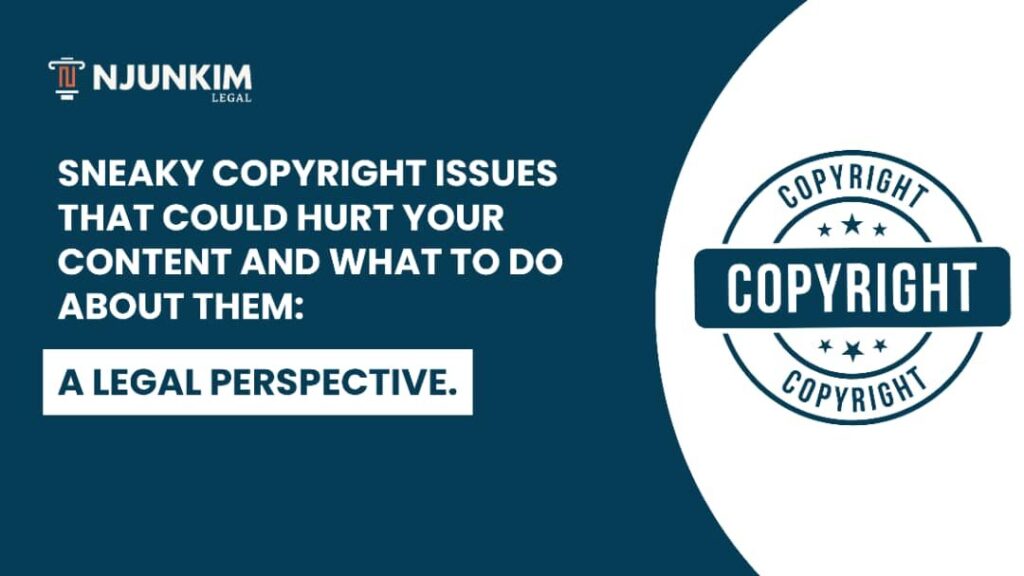In Nigeria’s fast-growing digital economy, content is currency. Businesses, influencers, and creators constantly produce blogs, reels, tweets, infographics, podcasts, and even AI-generated media to stay relevant. But in the rush to create, many fall into hidden copyright traps.
Copyright isn’t just a creative safeguard; it’s a legal shield and sword. Violations can lead to takedowns, lawsuits, fines, or reputational harm. This guide explores sneaky copyright issues Nigerian creators face, the legal implications, and practical steps to stay compliant.
1. Misunderstanding “Royalty-Free” Content
Many creators believe “royalty-free” means completely free. In reality, it often comes with conditions like attribution, non-commercial use, or restrictions on formats.
Legal Basis in Nigeria:
- The Copyright Act, 2022, protects all creative works once fixed in a medium (Section 2(1)).
- Ignoring license conditions may constitute unauthorised reproduction (Section 9).
Tip: Always read licensing terms carefully before using “free” images, music, or footage.
2. Sharing Screenshots of Articles or Social Media Posts
Reposting a full blog post, article, or tweet even with credit may violate copyright.
Legal Perspective:
- Section 9(h) grants owners the exclusive right to communicate works to the public.
- Nigeria is also bound by the Berne Convention (1886), which enforces international copyright rules.
Tip: Instead of screenshots, use attributed excerpts with commentary.
3. Embedding External Content (Tweets, YouTube, etc.)
Embedding lets you display third-party media on your site or pitch deck. While convenient, it may raise copyright issues.
Case Example: Goldman v. Breitbart (2018), embedding a tweet with an image was ruled an infringement.
Nigerian Context:
- Section 9(c) of the Copyright Act prohibits unauthorised public display.
- Risk areas:
- Embedding YouTube clips in sales decks
- Using Instagram posts in paid newsletters
- Including tweets in e-learning courses
4. Reposting Memes, GIFs, or User-Generated Content
Memes may seem like public property, but many contain copyrighted material. Using them without permission can violate both economic and moral rights.
Legal Basis:
- Section 14 protects an author’s moral rights, including attribution and protection from distortion.
- Meme creators can sue if their work is misused.
Tip: When in doubt, create original memes or request permission.
5. AI-Generated Content and Derivative Works
AI tools like ChatGPT, Midjourney, and DALL·E generate content based on training data, which may include copyrighted works.
Legal Insight:
- The Copyright Act, 2022, is silent on AI, but derivative works are protected (Section 2(2)(b)).
- AI outputs mimicking styles (e.g., Van Gogh or J.K. Rowling) could still infringe rights.
Remedies for Copyright Infringement
Under the Copyright Act, 2022, rights holders may pursue:
- Injunctions to stop further use (Section 37)
- Damages or profit recovery
- Delivery of infringing copies
- Criminal penalties (Section 44)
How Nigerian Creators Can Stay Safe
✔ Always review licenses for stock or royalty-free content
✔ Create original works or obtain written permission
✔ Quote instead of reposting entire works
✔ Run periodic copyright audits on websites and social media
✔ Consult an IP lawyer before major campaigns
Conclusion
Just because content is accessible doesn’t mean it’s free to use. For Nigerian creators and businesses, copyright literacy is a business necessity. As Nigerian courts adapt to the realities of digital media, enforcement will only become stricter.
By staying informed and compliant, you not only protect your brand but also strengthen the creative economy.

